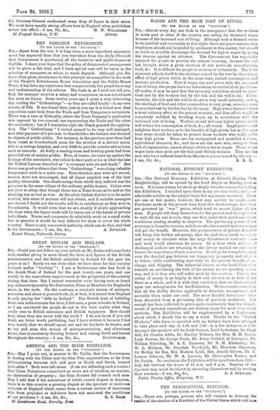WAGES AND THE HIGH COST OF LIVING.
[To THE EDITOR OE TEE " S PECTATOR." 1 Sin,—Almost every day one finds in the newspapers that the workers in some part or other of the country are calling for increased wages because of the increased cost of living. Although such a demand seems to be justified and reasonable at first sight, there are grave reasons why employers should not be guided by sentiment in this matter, but should as much as possible discourage the demand for high or wages by giving the reasons against an advance. The Governm ent has repeatedly enjoined the people to practise the utmost economy, because the war has brought about a great shortage of raw meter iel, maunfacluros, food, &c. It is difficult for people to economize voluntarily. The body economic adjusts itself to the shortage caused by the war by the natural effect of high prices which, at the same time, curtail consumption and increase production. Now if wages rise pan i pasau with the increased cost of living, the people have no inducement to restrict their purchases. Of couise, it may be said that the necessary restriction should be prac- tised not by the workers but by the rich and the well-to-do. Unfor- tunately, the rich and the well-to-do are a very small minority, and as the shortage of food and other commodities is very great, economy must be practised not by the few but by the many. High prices have therefore a most salutary effect at the present moment, and that effect would be completely nullified by levelling wages up in accordance with the increased cost of living. Workers should welcome higher prices, which will reduce the consumption of food, &c., all round. Employers should enlighten their workers as to the benefits of high prices, but at the same time steps should be taken to protect those workers who really suffer from high prices. These are the unorganized and unskilled workers, agricultural labourers, &c., and these aro the mon who, owing to their lack of organization, cannot always obtain a rise in wages. Those whose wages have risen most are the best-paid British workers. They are the men who have suffered least from the rise in prices caused by the wea-


































 Previous page
Previous page